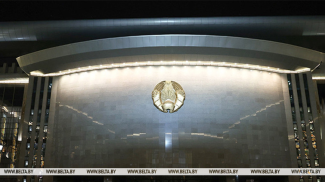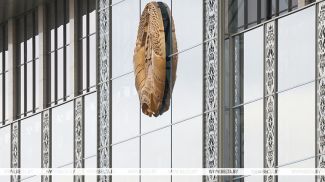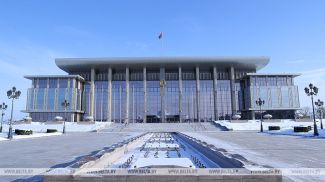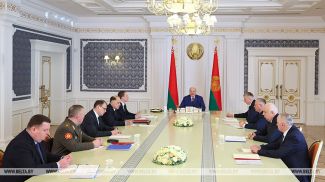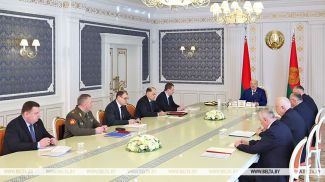LOGOISK DISTRICT, 23 September (BelTA) – A number of questions were asked about the forthcoming amnesty, presidential pardons, and infrequent mentions of political bargaining as Belarus President Aleksandr Lukashenko talked to reporters in the WW2 memorial complex Khatyn on 23 September, BelTA has learned.
Aleksandr Lukashenko said: “I never bargain when people are at stake. Maybe because I am a countryman and didn't grow up in present-day Minsk. I saw poverty and I saw genuine friendship and mutual assistance. And we fought each other with wooden sticks. But we helped each other afterwards, too. This is why these personal experiences from my childhood weigh heavily on me. I am always ready to jump into fire in order to protect someone. This is why there can be no bargaining here. You have to draw one conclusion out of it: if they rise to power, they will act just like they say. It will definitely happen like that.”
He stressed that he had never acted like that and is not going to. “This Polish woman [Chairwoman of the Union of Poles in Belarus Andzhelika] Boris is a testimony to that. She seemed like an enemy of Belarus. She happened to be there. And who helped her? No one did. No one rushed to protect her and the rest. Well, her mother (probably an elderly person already) wrote me a letter: ‘I am going to die soon'. The mother is probably our supporter. I thought: ‘Well, listen, Boris is guilty. She will serve her time and then what? The old woman came and made a request.' I… It was a personal decision. Everyone was against it. ‘What are you…' I said: ‘Is she going to turn the country upside down? No. She has to go free. The mother has come. I say: hand her over to her mother.' The mother came and took her. She is still grateful,” the Belarusian leader said.
“And this poor Boris is being tormented right now about the way the flag should be turned: to Poland or this way or that way. ‘No,' she said. ‘Thanks. Did you help me when I was serving my time? Nobody helped me.' Yes, she is not pro-Lukashenko. She may understand it deep in her soul and her heart. But she will not say it in public. But I know for sure today: she maintains this human stance. Not to mention her mother,” Aleksandr Lukashenko added.
This is why one cannot be “as thick as oak”, the head of state is convinced: “We dig in our heels and see no one anymore”. “There were people, who were indeed misled. Different people. They are people after all. As for those you've branded as criminals and the rest, I am not going to bargain even if it benefits the country. Because I know that… How am I going to look you in the eyes? If I let them go free if I am asked to? No way! It will never happen. They have to serve their time because it will happen again if we slack. But we have to make compromises where they are possible. It is our society after all,” Aleksandr Lukashenko noted.
He also mentioned an attempt on the life of the reporter Grigory Azarenok as well as unlawful actions with regard to his mother. “That scoundrel was caught. I said: ‘Well, bring him to Azarenok and his mother. May he grovel on his knees. If they don't forgive him, he will rot in prison.' But Azarenok forgave him. I didn't say ‘not the mother', but I said: ‘Him and his mother'. I thought he would not forgive him. But they forgave him. But I'd promised that if they forgave him, there would be one approach. Because on television Azarenok calls for crackdowns and tougher stance all the time. But he forgave him in person. I don't reproach either his mother or him. It is up to them to decide. They looked this scoundrel in the eyes. I didn't see him. They did the right thing,” Aleksandr Lukashenko believes.
“This is exactly how I act. If compromises are possible, I go for them. If compromises are not possible and we see the person is a die-hard enemy… Because if you have some power and force today, you have to restrain yourself, you cannot quarter people left and right,” Aleksandr Lukashenko is convinced.
Asked about the number of requests for presidential pardons, the president said: “Plenty. It is a continuous process. And not only from those crazies. No, there are various people [in prison]. A commission under the president takes care of pardons. And once we grant citizenship to someone, we constantly hear questions about pardons. Those are pardons. Not an amnesty.”
Speaking about amnesties, Aleksandr Lukashenko reminded that those are usually timed to various significant events and dates. “We may reduce the sentence time for some and we may let some go free. A handful will go free. Prison time can be reduced to 3, 4, 5 years instead of 6 and so on. An amnesty doesn't mean that everyone will walk free. No. Some will get more lenient sentences,” he said.
Aleksandr Lukashenko pointed out that the Belarusian society is now a big mess. “Yes, about 75% are our supporters and people, who have come to realize a lot. But 25% is a lot. It is 2.5 million people. And there are 10%, about one million people, who have always been our opponents. Some of them became simply enemies after that. We have to recognize them. We have to work with these, with the sandwiched layer. But we cannot lose sight of our people, too. A very delicate approach is required,” he said.
“This is why if you see that I let someone go or relax something or do something else, don't think that I bargain with your opinions. You cannot even imagine the pressure I am dealing with, primarily from your side. I am afraid of failing you. I think you are manning the barricades and support me over there, make some idol out of me. How can I fail you? You are genuine civil servants, who support the country. You cannot imagine that it is the most responsible business,” the Belarusian leader noted.
“Don't worry: I estimate all of it, pile it all together, I divide or do not divide, I make compromises or not. But those, who have to serve prison time, will do so. I have more information after all. And I don't bargain with people's fates in exchange for money or for no special reason. I am not accustomed to that. Never take someone else's things and never offend people. Justice above all, justice as much as possible, and fairness,” the president concluded.




